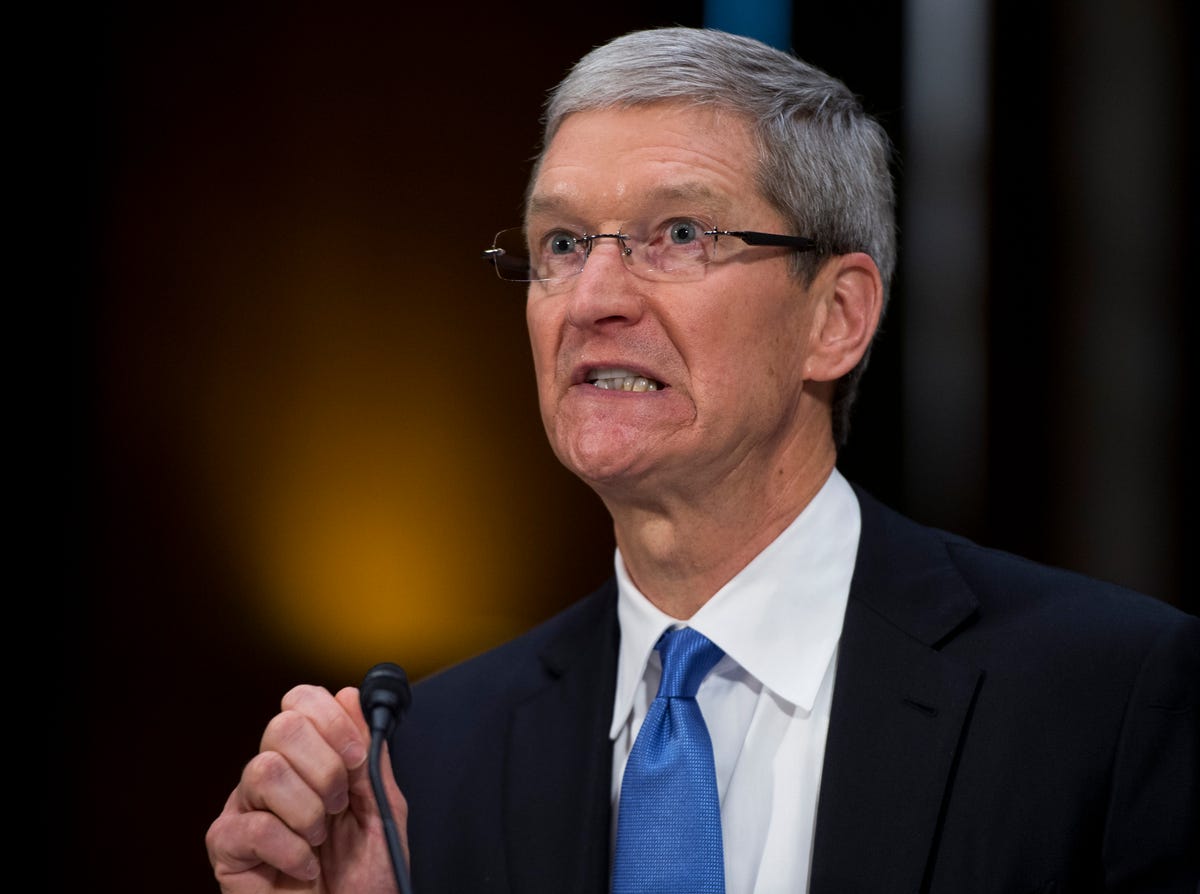
Tom Williams/CQ Roll Call/Getty Images
Apple CEO Tim Cook two years ago testified before the US Senate that his company wasn’t a tax dodger.
Now, Apple — the world’s biggest public company with a market value of over $750 billion — may be forced to pay up to 10 years worth of back taxes to Ireland, according to a regulatory filing made by the company on Tuesday. Apple noted the amount could be “material,” though said it couldn’t estimate the level.
“The company believes the European Commission’s assertions are without merit,” Apple said in the filing with the US Securities and Exchange Commission. The company didn’t immediately respond to a request for further comment.
The European Union in June 2014 opened an investigation into Apple’s tax practices in Ireland. At the time, the group said it was examining whether Apple’s tax rate — about 2 percent, which is far less than the standard 12.5 percent corporate tax — amounted to illegal state aid from Ireland. Apple has said it obtained the better rate through negotiations with the Irish government.
See also
- China passes US to become Apple’s biggest iPhone marke
- Strong iPhone demand pushes Apple’s sales — again
- Apple dodged paying billions in taxes, subcommittee says
The company operates two subsidiaries in Ireland. It doesn’t have to pay US taxes on the money generated from regions those businesses serve — including Europe, the Middle East and Africa — as long as the money remains overseas and is reinvested in non-US regions. The EU, however, believes the rate Apple pays in Ireland is too low, even for a country where the normal corporate tax rate is about a third the rate of the US.
“When public budgets are tight, and citizens are asked to make efforts to deal with consequences of the crisis, it cannot be accepted that large multinationals do not pay their fair share in taxes,” Europe’s competition commissioner Joaquín Almunia said last year when announcing the investigation.
EU and US investigations
The EU probe follows a similar investigation by the US government. A US Senate subcommittee in May 2013 questioned Cook about the amount of cash Apple keeps offshore, saying it exploited tax loopholes by setting up subsidiaries in overseas locations with lower tax rates. The US Internal Revenue Service is currently examining Apple for the years of 2010 through 2012.
Cook, in his opening statement at the Senate hearing in 2013, said Apple had become “the largest corporate income taxpayer in the United States,” with a 2012 federal cash effective tax rate of 30.5 percent. That year, Apple paid the US Treasury nearly $6 billion in cash, which equated to more than $16 million per day. The company disclosed Tuesday that for the quarter ended March 28, it paid a tax rate of 26.9 percent, which is below the US federal rate of 35 percent because of its overseas holdings in Ireland.
As of March 28, Apple had $193.5 billion in cash plus marketable securities, up $15.6 billion from three months earlier. More than $171 billion, or 89 percent, of that amount is held overseas. Cook testified in 2013 that Apple’s foreign subsidiaries at the time held 70 percent of the company’s cash “because of the rapid growth of our international business.”
“Under the current US corporate tax system, it would be very expensive to repatriate that cash,” Cook said during his Senate testimony in 2013. “Unfortunately, the tax code has not kept up with the digital age. The tax system handicaps American corporations in relation to our foreign competitors who don’t have such constraints on the free flow of capital.”
Inside Apple Watch launches around the world (pictures)






Apple’s revenue increasingly is coming from overseas, which boosts the amount of cash held outside the US. In the most recently reported quarter, 37 percent of Apple’s sales, or $21.3 billion, came from the Americas while the remainder came from Europe, Greater China, Japan and the rest of Asia Pacific. Greater China passed Europe to become Apple’s second largest market overall with revenue of $16.8 billion. The region also surpassed the US to become Apple’s biggest iPhone market. Overall, Apple’s generated $58 million in revenue in the fiscal second quarter that ended March 28.
Apple’s not alone when it comes to finding strategies to avoid paying high tax levels. Many large US companies, facing the possibility of steep tax bills in their home countries, have taken steps over the years to shift revenue into overseas shell companies. Some, like Cisco and Qualcomm, have pushed for tax holidays that would allow them to bring foreign-held cash back to the US at much lower tax rates. They have argued that such holidays would allow them to create more jobs and help the economy, but critics say that’s often not true. Instead, companies often institute dividends and other policies to reward investors and executives.
Still, Apple and others have defended their tax strategies.
“We pay all the taxes we owe — every single dollar,” Cook testified in 2013. “We not only comply with the laws, but we comply with the spirit of the laws. We don’t depend on tax gimmicks. We don’t move intellectual property offshore and use it to sell products back into the US to avoid US taxes. We don’t stash money on some Caribbean island. We don’t borrow money from our foreign subsidiaries to fund our US business in order to skirt the repatriation tax.”
The Wall Street Journal earlier reported the news.



